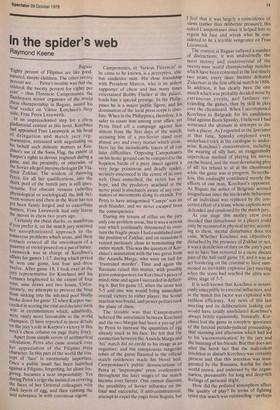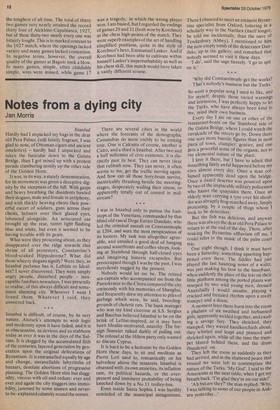In the spider's web
Raymond Keene
Baguio 'Eighty percent of Filipinos are like goodnatured, simple children. The other twenty Percent are. . . Petra's trouble was that she mistook the twenty percent for eighty per cent — thus Florencio Campomanes, the flamboyant senior organiser of the world Chess championship in Baguio, issued. his final verdict on Viktor Korchnoi's fiery aide, Frau Petra Leeuwerik.
In. an unprecedented step for a chess gladiatorial contest at this level, Korchnoi had appointed Frau Leeuwerik as his head of delegation and match jury representative, entrusted with negotiating on his behalf such delicate matters as Korchnoi's use of the Swiss Flag, the extent of Karpov's rights to devour yoghourt during a gatne, and the proximity, or otherwise, of the Soviet alleged parapsychologist Dr Vladimir Zukhar. The wisdom of throwing Petra, for all her qualifications, into the Shark pool of the match jury is still questionable. For obscure reasons (whether Physiological or sociological) the link bet1A'een women and chess in the West has not Yet been firmly forged and to exacerbate matters, Frau Leeuwerik had only learnt the moves in chess two years ago. . Certainly the chess sharks, or mandarins if you prefer it, on the match jury resented her unsophisticated approach to the numerous problems which arose, and their contacts evinced all the smoothness of a quantity of vitriol poured on a pat of butter. Leeuwerik was in charge of Korchnoi's affairs for games 1-17. during which period he won one game, lost four and drew twelve. After game 18, I took over as the Jury representative for Korchnoi and his fortunes brightened to the extent of four wins, nine draws and two losses. Unfortunately, my attempts to prevent the boat from sinking into the infested pool finally broke down for game 32 when Karpov succeeded in scoring the vital and decisive sixth win: in circumstances which, admittedly, were vastly more favourable to the world champion. (I have reported in more details on the jury's role in Karpov's victory in this week's chess column on page thirty four). Apart from simple errors of arithmetical calculation, Petra also came unstuck over her appreciation of the Filipino male character. In this part of the world the concept of 'face' is enormously important. Once a public insult has been launched against a Filipino, forgetting, let alone forgiving, becames a near impossibility. Yet during Petra's reign she insisted on covering the faces ofher Oriental colleagues with thick-layers of egg, and then rubbing the said substance in with enormous vigour. Campomanes, or 'furious Florencio' as he came to be known, is a perceptive, able but vindictive man. His close friendship with President Marcos, who is an ardent supporter of chess and has many times entertained Bobby Fischer at the palace, lends him a special prestige. In the Philippines he is a major public figure, and his domination of the local press corps is absolute. When in the Philippines, therefore, it is safer to count him among your allies, yet Petra fired off a campaign against him almost from the first days of the match, accusing him of a pro-Soviet stand over almost any and every matter which arose. Here lay the ineradicable traces of all our later difficulties. Opposing Campomanes on his home ground can be compared to the hopeless battle of a puny insect against a very large poisonous and deadly spider, securely ensconced in the centre of its owe web. Once enmeshed, the victim has no hope, and the predatory arachnid at the nerve point is absolutely aware of any resonances or movements along its strands. For Petra to have antagonised 'Campo' was an arch blunder, and we never escaped from the consequences.
During my tenure of office on the jury only one problem arose, but it was a serious one which continually threatened to overturn the fragile peace I had established over the position of Zukhar, and on occasions it veered perilously close to terminating the entire match. This was the question of Korchnoi's association with the two gurus from the Ananda Marga, who were on bail for 'frustrated murder'. Time and again the Russians raised this matter, with possibly grave consequences for Korchnoi's peace of mind; time and again I succeeded in deflecting it. But for game 32, when the score was 5-5 and one win would bring immediate overall victory to either player, the Soviet reaction was brutal, and power politics took the place of chess.
The trouble was that Campomanes believed the association between Korchnoi and the two Margas had been a put-up job by Petra to increase the quantities of egg already stuck to his face. He felt that the connection between the Ananda Marga and 'his' match did no credit to his image as an organiser, and the conspicuous tangerine robes of the gurus flaunted in the official match residences made his blood boil. Campomanes's public denunciations of Petra at 'impromptu' press conferences throughout the later stages of the match became ever fiercer, One cannot discount the possibility of Soviet influence on the final and successful, if anti-constitutional, attempt to expel the yogis from Baguio, but feel that it was largely a coincidence of views (rather than deliberate pressure); this suited Campomanes since it helped him to regain his face and wreak what he considered to be a terrible vengeance on Frau Leeuwerik.
The contest at Baguio suffered a number of distinctions: it was undoubtedly the most stormy and controversial of the twenty-nine world championship matches which have been contested in the last ninety two years, every since Steinitz defeated Zukertort in the first official match in 1886. In addition, it has clearly been the one match which was probably decided more by extraneous events, and fanfares surrounding the games, than by skill in play over the chessboard. When I accompanied Korchnoi to Belgrade for his candidates final against Boris Spassky, I believed I had witnessed the ultimate in attempts to disturb a player. As I reported in the Spectator at that time, Spassky employed every underhand trick in the catalogue to undermine Korchnoi's concentration, including the wearing of silly hats, an exaggeratedly supercilous method of playing his moves on the board, and the most devastating ploy of all: his refusal to sit at the chessboard while the game was in progress. Nevertheless, this onslaught constituted merely the efforts of one man, Korchnoi's opponent. At Baguio the antics of Belgrade seemed insignificant since the intolerable behaviour of an individual was replaced by the concerted effort of a team, whose exploits were defended and condoned by the match jury.
At one stage this motley crew even decided that disturbance to a player could only be measured in physical terms; according to them, mental disturbance does not exist. Whether Korchnoi was objectively disturbed by the presence of Zukhar or not, it was a dereliction of duty on the jury's part not to have him removed to a more distant part of the hall until game 18, and it was an act bordering on the criminal to have summoned an inevitably explosive jury meeting when the score had reached the ultra sensitive stage of 5-5.
It is well-known that Korchnoi is notoriously susceptible to external influences, and in the match this factor was exploited with ruthless efficiency. Any news of this last meeting and its deliberations leaking out would have totally annihilated Korchnoi's always brittle equanimity. Ironically. Korchnoi lost the game in complete ignorance of the farcical pseudo-judicial proceedings that morning and afternoon which had led to his 'excommunication' by the jury and the banning of his friends. But that does not alter the harsh fact that the malevolent intention to disturb Korchnoi was certainly present and that this intention was inaugurated by the Russians, fearful for their world crown, and endorsed by the organisation, presumably for long and deep-felt feelings of personal slight. How did the polluted atmosphere affect the quality of play? In terms of fighting spirit this match was outstanding — perhaps the toughest of all time. The total of thirty two games very nearly attained the record thirty four of Alekhine-Capablanca, 1927, but of these thirty-two nearly every one was bitterly fought. This is in marked contrast to the 1927 match, where the openings lacked variety and many games lacked contention. In negative terms, however, the overall quality of the games at Baguio took a blow. In many games, simple, often childishly simple, wins were missed, while game 17 was a tragedy, in which the wrong player won.' am biased, but I regarded the endings of games 29 and 31 (both won by Korchnoi) as the chess high-points of the match. They were superb examples of the art of handling simplified positions, quite in the style of Korchnoi's hero, Emmanuel Lasker. And if Korchnoi had been able to cultivate within himself Lasker's imperturbability as well as his chess skill, this match would have taken a vastly different course.







































 Previous page
Previous page